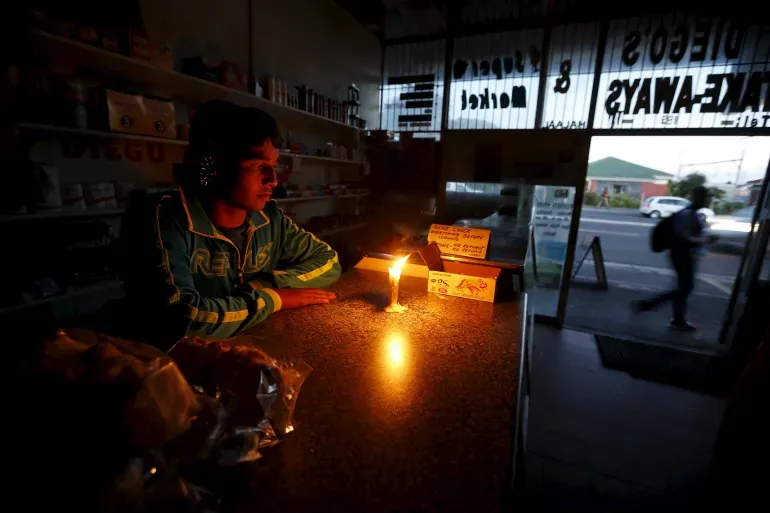Johannesburg, South Africa– As South Africa approaches its general elections, the nation’s chronic power outages and crumbling infrastructure remain at the forefront of public concern.
Business owners like Lezanne Viviers, a fashion industry professional in Johannesburg, have been grappling with persistent electricity cuts since 2007, when state-owned electricity supplier Eskom began implementing scheduled blackouts known as “load shedding.”
“We weren’t ready for it. But us South Africans are very resilient,” Viviers told Al Jazeera. “When there was load shedding, we worked with our hands and made use of the sunshine. I also bought a back-up engine. That was useful, as some power outages last year persisted all day.”
Despite a recent stretch of uninterrupted power for 57 days—the longest in over two years—skepticism remains. Allegations of electioneering have surfaced, suggesting that the government is manipulating power availability ahead of next week’s general ballot.
The ongoing power crisis has forced many businesses to invest in costly diesel generators or solar panels, often at the expense of other critical investments. Small and informal businesses, unable to afford these secondary power sources, are particularly hard hit, with daily power outages in 2023 costing the economy an estimated 926 million South African rand ($51 million) a day, according to the country’s Reserve Bank.
Viviers installed a solar panel to avoid frequent electricity failures. “I know the next government faces numerous challenges. But making sure the lights work for most people seems like a good place to start,” she said.
Broader Infrastructure Concerns
Power issues are just one of the many challenges facing South Africa. Decades of underinvestment and poor maintenance have led to deteriorating transport networks and water supplies. The ruling African National Congress (ANC), in power since the end of apartheid in 1994, is now at risk of losing its parliamentary majority due to these infrastructure woes—a key voting issue.
A BrandMapp-Silverstone survey conducted last year revealed that two-thirds of middle-income respondents would consider rejecting the ANC because of prolonged power failures. Eskom, once a top-tier utility company, has become synonymous with dysfunction. Poor maintenance, corruption, and theft of coal and copper have plagued the utility, which was once self-financing and provided some of the world’s cheapest electricity.
From 2009 to 2018, under President Jacob Zuma, Eskom became a focal point of “state capture,” where public resources were redirected into private hands. President Cyril Ramaphosa declared a state of disaster last February as blackouts reached up to 12 hours a day. The government provided $14 billion in debt relief to Eskom, but conditioned the bailout on unpopular tariff increases and structural reforms.
Increasing Role of Private Sector
Efforts to diversify South Africa’s energy sources are gaining momentum. Private investment in wind farms and nuclear plants has increased since the government scrapped licensing requirements on green power stations. The private sector now generates 10.4 gigawatts of electricity, nearly half of Eskom’s capacity, marking a significant shift from reliance on coal.
Chief economist Azar Jammine of Econometrix noted, “Large users of electricity are increasingly able to bypass Eskom by producing their own power. Households are doing the same with solar panels. It’s a sign that energy policy is headed in the right direction.”
Water and Transport Troubles
Water infrastructure faces similar challenges. Johannesburg’s water board, Rand Water, claims nearly half of all piped water is lost to leaks. Poor power coverage has also disrupted water treatment plants, exacerbating water shortages.
Professor Richard Meissner from the University of South Africa highlighted the widespread infrastructure issues: “Municipal delivery systems are old. Water plants are subject to vandalism, and we don’t have a culture of maintenance, especially in rural areas.”
Transnet, the state-backed rail company, is also struggling with mismanagement and corruption. Last year, inadequate railways caused significant economic losses, estimated at 6 percent of GDP.
Economic and Political Implications
As voters prepare for the elections, they face numerous issues including high unemployment and poverty rates. In 2019, the ANC received 57 percent of the vote but is now expected to need a coalition to retain power. South Africa’s debt-to-GDP ratio has swelled to 74 percent, with over one-fifth of tax revenues spent on interest payments, reducing funds available for education, healthcare, and infrastructure.
Aurelien Mali, a senior credit officer at Moody’s Investors Service, emphasized the importance of job creation and private investment in infrastructure to address South Africa’s challenges. “This is going to be a multi-decade programme. But if we start to see meaningful improvements to South Africa’s infrastructure, it could create a virtuous circle of development.”
As South Africa heads to the polls, the electorate’s focus on power, water, and infrastructure could significantly influence the election’s outcome and shape the country’s future policies.
https://www.africanexponent.com/top-problems-for-fixing-in-south-africa-as-may-29-election-heatsup/


